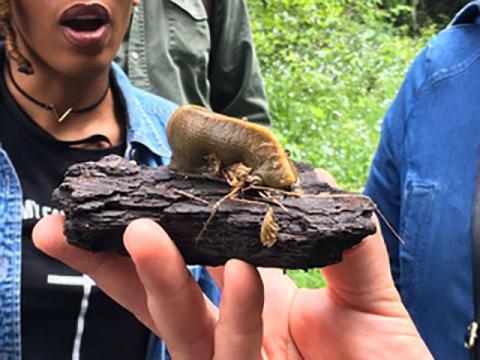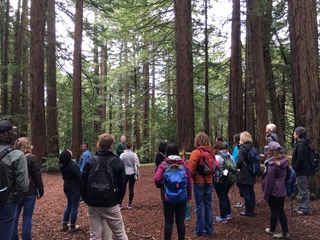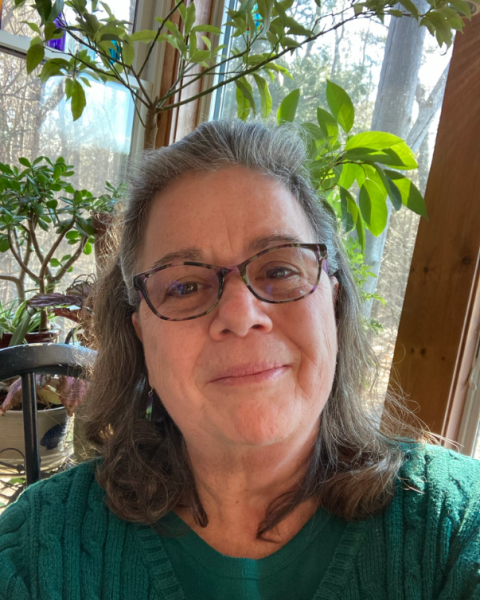Connecting Children and Families to Nature

In mid-May I had the great fortune to expand my learning and connections as a Natural Resources Steward (NRS) when I attended the Children & Nature Network (C&NN) International Conference for four days in Oakland, California. As Richard Louv (author, Last Child in the Woods) said in his remarks that opened the conference, we were surrounded by our “nature peeps”!
Among the presenters and attendees were an amazing array of people from across the country and around the world, including naturalists, educators, park officials, youth leaders, museum staff, librarians, government officials, and researchers. C&NN was created to put together a global community of leaders working to connect children to the benefits of nature. By the looks of the conference that community is large and growing!
Part of my own personal mission as a Natural Resources Steward is to connect families to the outdoors – especially those families for whom time outdoors is a challenge or feels inaccessible. The variety of workshops and field trips that I participated in throughout my time at the conference truly enriched my sense of the possibilities of getting more families in nature, as well as building my understanding of why this work is so important.

Many of the speakers emphasized the basic human right to have access to nature, while also highlighting that we can’t assume that people with less contact to nature want it any less than the rest of us. The new concept of pediatricians prescribing time in nature as a means of dealing with children’s anxiety and depression was looked at throughout this conference, and I had the chance to speak with an attendee from Seattle who is piloting a program to get all of that city’s pediatricians on board with this concept (Project Nature).
The consistent message throughout the C&NN conference was that too frequently when we are thinking about, planning for, or reflecting on the outdoors we are drawing from narratives that are not entirely inclusive. One speaker, Nikki Pitre/Meadowlark, from the Center for Native American Youth, stated simply but profoundly, “ No matter where you are, you are on sacred Native American land.” She went on to remind us that, “When you discuss the outdoors and nature, remember the indigenous people.”
Later that day, I participated in a workshop titled, ‘The Untold Stories of Communities of Color’, that encouraged us as we work in nature, and with children in nature:
- to “be equitable educators and tell the whole story”
- that “you can acknowledge and use different truths” and
- there’s no one story that encompasses the whole truth of anything.
The leaders of this conference expanded upon these thoughts on diversity and inclusion in the natural world by encouraging the participants of this conference to stretch outside of our comfort zones through learning – gathering information about local history going way back and asking questions about equity, education, and social justice -- and to bring our enriched knowledge back to our work in nature with children and people in general.

As Natural Resources Stewards, many of us have found a deep reverence and curiosity among the trees – for me this is certainly true – so the opportunity to join in on the field trip titled, ‘Climate Change and Resiliency in the Redwoods’ was one I was not going to miss. This particular excursion was such a similar setup to a NH NRS class (or any of the enrichment opportunities Mary Tebo Davis puts together for us) that it felt almost as though I had never left home. We spent our morning exploring Roberts Regional Recreational Area with the guidance of a variety of local experts – the recreational services manager, the naturalist for the park, the park manager, and two educators who let us shadow them as they facilitated a high school AP Science class on how to measure trees and conduct phenology research (two skills that I just gained through the NRS and NH Big Trees program in the last month!).
Being among my “nature peeps” in these redwoods was a reminder of why being a Steward is so important, and so natural to me, and I have seen it in many fellow stewards, too. As was declared in one of this conference’s keynote speeches, “time in nature is transformative”!
Drawing from this collective connection to nature, a group of strangers felt among the trees, and weaving in the insight gained from the tapestry of ideas throughout the rest of this enriching conference, I returned to New Hampshire with a renewed sense of use of my hands, my voice, and my heart to care for the natural world and nurture environmental stewardship in others.
Images by Heather Flewelling. Heather lives in Exeter, NH tending to her family, the land, and her community. A 2017 Natural Resources Steward, Heather loves to participate in the hands-on work of this commitment - including trail work, litter pick-ups, planting, and counting species.

